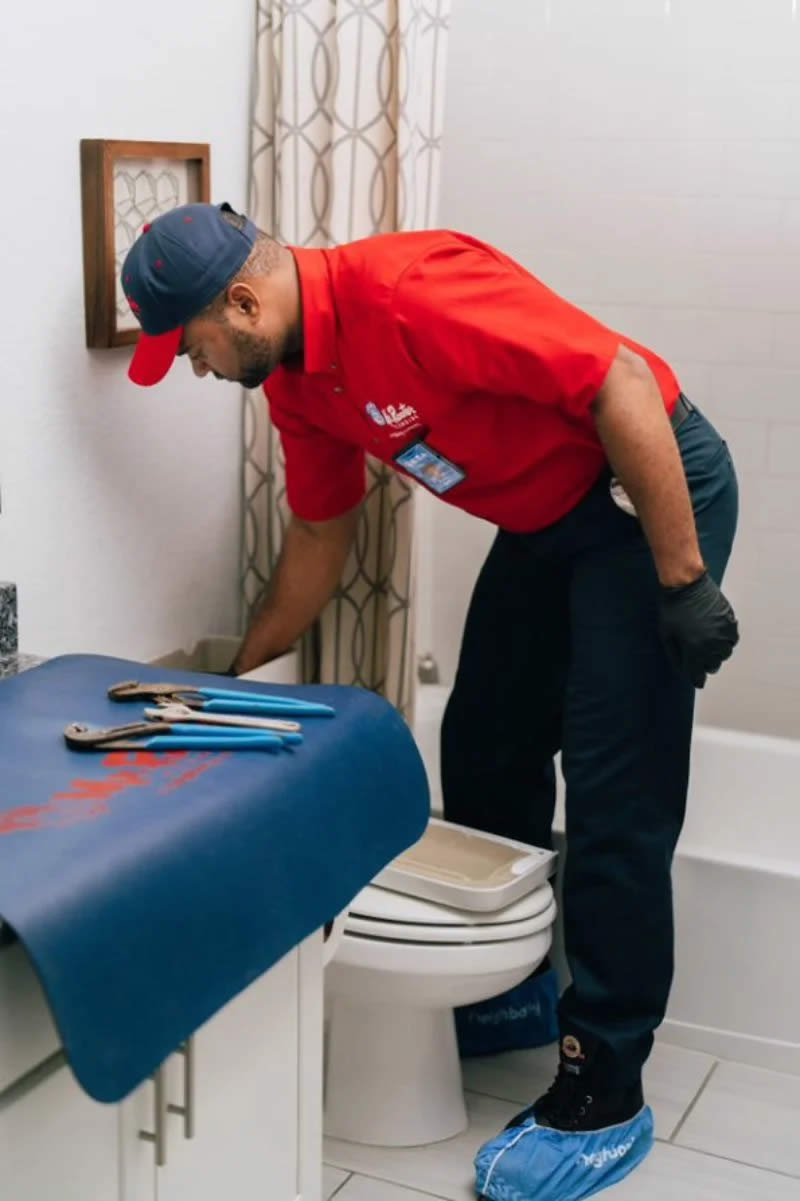Yes, tree roots can invade sewer lines and cause blockages or damage. Regular inspections and root removal services can help protect your pipes from root intrusion and keep your plumbing flowing smoothly.
Do you have a question about our services or how your plumbing system operates? Read the most common questions we receive and our responses below. If you still need help, please do not hesitate to call us.
Yes, tree roots can invade sewer lines and cause blockages or damage. Regular inspections and root removal services can help protect your pipes from root intrusion and keep your plumbing flowing smoothly.
Signs of main water line problems include sudden drops in water pressure, discolored water, pooling water in your yard, and higher-than-normal water bills. Taking care of these signs early can prevent major damage.
Regular inspections, prompt repairs of leaks, cleaning drains, and seasonal maintenance can help keep your plumbing system in good shape. Simple preventive measures can save you from costly repairs.
A high water bill may indicate a hidden leak, increased water usage, or issues with your water meter. It’s important to investigate the cause to prevent further water waste and costs.
If you smell gas, leave the area immediately and avoid using electrical devices or open flames. Contact a plumber to inspect and fix any gas leaks quickly to ensure safety.
Inconsistent water temperatures could be caused by a faulty mixing valve, sediment buildup in the water heater, or issues with water pressure. Addressing these problems can help stabilize temperature fluctuations.
Water hammer is a banging noise in your pipes caused by sudden changes in water flow or pressure. It can often be fixed by installing air chambers or water hammer arrestors in your plumbing system.
To avoid clogs, avoid pouring grease, coffee grounds, and large pieces of food down the drain. Use a strainer to catch debris and regularly clean the drain with hot water.
Turn off the power supply to the water heater and shut off the water flow to the unit. A leaking water heater often indicates a serious problem and may require repair or replacement.
Signs of a sewer line clog usually include multiple slow drains, gurgling noises from toilets, and sewage backups in your household. A professional inspection can help you find out the cause and an appropriate solution.
A sump pump is designed to remove excessive amounts of water from crawl spaces or basements to prevent flooding. It’s very useful in homes prone to water accumulation during heavy rains.
First, try resetting the disposal unit by pressing the reset button on the bottom. If that doesn’t work, check for jams, clear any blockages, and ensure the power supply is intact.
Dripping faucets could be caused by worn-out washers, O-rings, or seals. These pieces can deteriorate over time, leading to leaks that waste water and increase your monthly utility bills.
Rusty water can be caused by corrosion in your pipes, aging water heaters, or disturbances in the water supply line. It’s important to identify the source and address any potential health concerns.
Reducing water usage can be achieved by fixing leaks, installing low-flow fixtures, using water-efficient appliances, and being mindful of water consumption habits, such as shorter showers.
A running toilet is most often caused by a dysfunctional flapper, fill valve, or float. These parts may need adjustment or replacement to stop water from continuously flowing into the bowl.
Hard water has higher levels of minerals that can cause buildup in pipes and appliances. Soft water, on the other hand, has fewer minerals and is gentler on plumbing systems.
Drains should be cleaned at least once a year to prevent buildup and blockages. Regular maintenance can help avoid major issues and keep your plumbing system functioning well.
A backflow preventer stops contaminated water from flowing back in your clean water supply. It’s important in areas where the risk of contamination is high, such as homes with irrigation systems.
Recurring clogs are often due to buildup of hair, soap, grease, or other objects in the drain. Regular cleaning and avoiding improper disposal of waste can help prevent frequent blockages.
Low water pressure is usually caused by clogged pipes, leaks, issues with your main water supply, or faulty fixtures. It’s important to figure out the root cause to ensure proper repairs.
To prevent pipes from freezing, it's important to insulate exposed pipes, keep your home warm, and let faucets drip during extremely cold weather. These measures help maintain water flow and reduce the risk of burst pipes.
Common signs of a plumbing leak include unexpected increases in your water bill, wet areas on walls, the sound of running water when no taps are on, and low water pressure. If you notice any of these signs, it’s best to address the issue fast.
